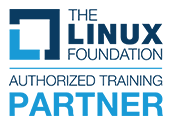
Kubernetes is a high-velocity open source orchestration tool to deploy, scale, and update containerized applications. This Kubernetes for App Developers training course will teach you how to containerize, host, deploy, and configure an application in a multi-node cluster.
Starting with a simple Python script, you will define application resources and use core primitives to build, monitor and troubleshoot scalable applications in Kubernetes. Working with network plugins, security and cloud storage, you will be exposed to many of the features needed to deploy an application in a production environment.
The topics covered are directly aligned with the knowledge domains tested by the Cloud Native Computing Foundation Certified Kubernetes Application Developer (CKAD) Program, and will substantially increase students’ ability to become certified.
In this course you’ll learn how to:
- Containerize and deploy a new Python script
- Configure the deployment with ConfigMaps, Secrets and SecurityContexts
- Understand multi-container pod design
- Configure probes for pod health
- Update and roll back an application
- Implement services and NetworkPolicies
- Use PersistentVolumeClaims for state persistence
- And more
This course is designed to be vendor- and distribution-neutral, so you will be able to apply these concepts universally.